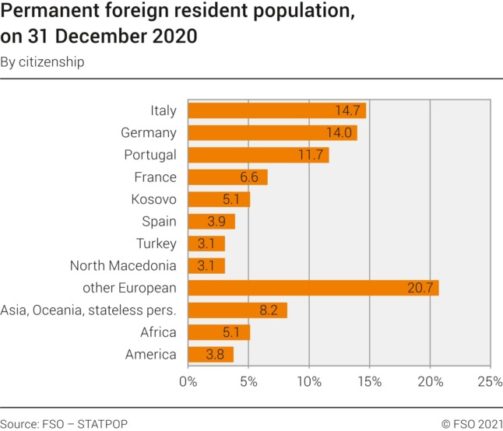While moving to Switzerland in pursuit of work is a major factor for many, the study also found a higher level of unemployment among foreigners when compared to the general population.
The unemployment rate among foreigners is seven percent, compared to just three percent for Swiss nationals without a migration background.
This is the case despite foreigners in Switzerland being ‘overqualified’ in compared to Swiss nationals.
The FSO found that 19 percent of unemployed first generation foreigners were overqualified, compared with 12 percent of Swiss nationals without a migration background. Unemployed second generation foreigners were also deemed to be 12 percent overqualified.
READ MORE: Is Basel the best Swiss city for foreigners and Geneva the worst?
First generation foreigners also had less seniority in their workplaces than second generation or Swiss nationals, although the difference was relatively negligible.
In total, 32 percent of first generation foreigners had a managerial function, compared with 35 percent of Swiss nationals or 32 percent of second generation foreigners.
The Swiss government was careful to point out that this study only took into account migration status and employment status.
Other factors such as age and education level were not considered but would be relevant in determining employment outcomes.
More information about the study and its underlying statistics can be found here.
Almost 40 percent of Swiss residents have a ‘migration background’
Over 2.7 million people in Switzerland — 38 percent of the permanent residents aged 15 and over — had a migration background in 2020, according to new data from the Swiss Statistics Office (FSO).
Compared to 2019, this represents an increase of 0.3 percentage points.
Among the population with a foreign background, 80 percent (2.2 million) were born abroad, while the remaining 20 percent (530,000) were born in Switzerland.
The amount of foreigners tends to be higher in the cities such as Zurich and Geneva, although some less urbanised cantons such as Ticino also have a high proportion of foreign residents or residents with a migration background.
READ MORE: Where in Switzerland do all the international residents live?
Where do foreigners living in Switzerland come from?
As this FSO chart shows, most represented nationalities among the migrant population are Italian and German.
The following shows the percentages of the total foreign population, rather than the percentage of the population as a whole, including Swiss nationals.




 Please whitelist us to continue reading.
Please whitelist us to continue reading.
Member comments